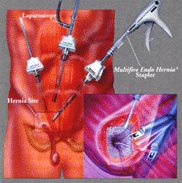
A hernia is a defect in the abdominal wall, in which the inside layers of the abdominal muscle have weakened resulting in a bulge or tear. In the same way that an inner tube pushes through a damaged tire, the inner lining of the abdomen pushes through the weakened area of the abdominal wall to form a small bubble or balloon-like sac. When a loop of intestine or abdominal tissue pushes into the sac, severe pain and other potentially serious complications can result.
Both men and women can get a hernia. Some hernias are present at birth (congenital), while others develop over time. A hernia does not get better over time; a hernia will not go away by itself. Hernias most commonly occur in the groin ('inguinal hernias'), around the belly button ('umbilical hernias'), and near the site of a previous surgical operation ('incisional hernias').
Frequently, hernias are easily felt and diagnosed. You may notice a bulge under the skin. You may feel pain when you lift heavy objects, cough, strain during urination or bowel movements or during prolonged standing or sitting.
The pain may be sharp and immediate or a dull ache that gets worse toward the end of the day. Severe, continuous pain, redness and tenderness are signs that the hernia may be entrapped or strangulated. These symptoms are cause for concern and immediate contact of your physician or surgeon.

The wall of the abdomen has natural areas of potential weakness. Hernias can develop at these or other areas due to heavy strain on the abdominal wall, aging, injury, an old incision or a weakness in the abdominal wall present at birth. Anyone can get a hernia at any age. Most hernias in children are congenital. In adults, a natural weakness or strain from heavy lifting, persistent coughing, difficulty with bowel movements or urination can cause the abdominal wall to weaken or separate, and hernias to form.
There is no acceptable nonsurgical medical treatment for a hernia. The use of a truss (hernia belt) can help keep the hernia from bulging but eventually will fail. The truss also causes the formation of scar tissue around the hernia making the repair more difficult. If you suspect you have a hernia, consult with your physician or surgeon promptly. Delayed hernia repair can result in intestinal incarceration (intestine is trapped inside the hernia sac) or strangulation (intestine is trapped and develops gangrene). The latter is a surgical emergency.
The hernia will not go away without treatment; it will only get bigger. The bigger the defect the bigger the operation required to fix it.
Under certain circumstances the hernia may be watched and followed closely by a physician. These situations are unique to those individuals who are at high operative risks (i.e. those with severe heart or lung disease, or bleeding problems). Of course, even in the high risk person, if the symptoms become severe or if strangulation occurs, then an operation must be performed.
There are two main options for hernia repair:
In laparoscopic hernia surgery, a telescope attached to a camera is inserted through a small incision that is made under the patient's belly button. Two other small cuts are made (each no larger than the diameter of pencil eraser) in the lower abdomen. The hernia defect is reinforced with a 'mesh' (synthetic material made from the same material that stitches are made from) and secured in position with stitches/staples/titanium tacks or tissue glue, depending on the preference of your individual surgeon.
Enter your details below & we will call you back